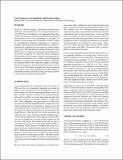Low-frequency extrapolation with deep learning
Author(s)
Sun, Hongyu; Demanet, Laurent
DownloadAccepted version (672.9Kb)
Terms of use
Metadata
Show full item recordAbstract
The lack of the low frequency information and good initial model can seriously affect the success of full waveform inversion (FWI) due to the inherent cycle skipping problem. Reasonable and reliable low frequency extrapolation is in principle the most direct way to solve this problem. In this paper, we propose a deep-learning-based bandwidth extension method by considering low frequency extrapolation as a regression problem. The Deep Neural Networks (DNNs) are trained to automatically extrapolate the low frequencies without prepro-cessing steps. The band-limited recordings are the inputs of the DNNs and, in our numerical experiments, the pretrained neural networks can predict the continuous-valued seismograms in the unobserved low frequency band. For the numerical experiments considered here, it is possible to find the amplitude and phase correlations among different frequency components by training the DNNs with enough data samples, and extrapolate the low frequencies from the band-limited seismic records trace by trace. The synthetic example shows that our approach is not subject to the structural limitations of other methods to bandwidth extension, and seems to offer a tantalizing solution to the problem of properly initializing FWI.
Date issued
2018-08Department
Massachusetts Institute of Technology. Department of Earth, Atmospheric, and Planetary Sciences; Massachusetts Institute of Technology. Department of MathematicsJournal
SEG Technical Program Expanded Abstracts 2018
Publisher
Society of Exploration Geophysicists
Citation
Sun, Hongyu and Demanet, Laurent. "Low-frequency extrapolation with deep learning." SEG Technical Program Expanded Abstracts (2018): 2011-2015 © 2018 Author(s)
Version: Author's final manuscript
ISSN
1949-4645
1052-3812